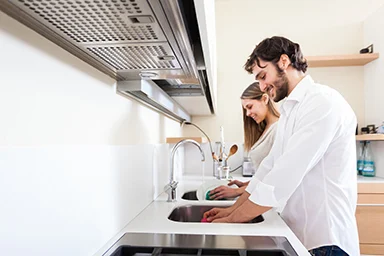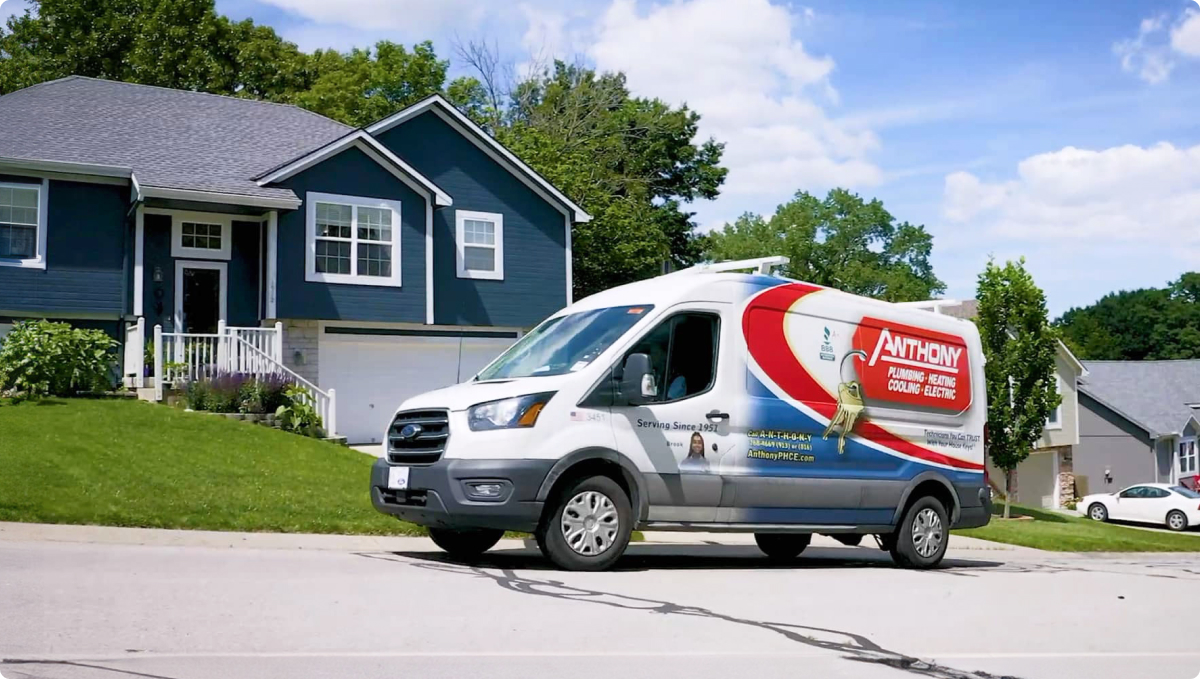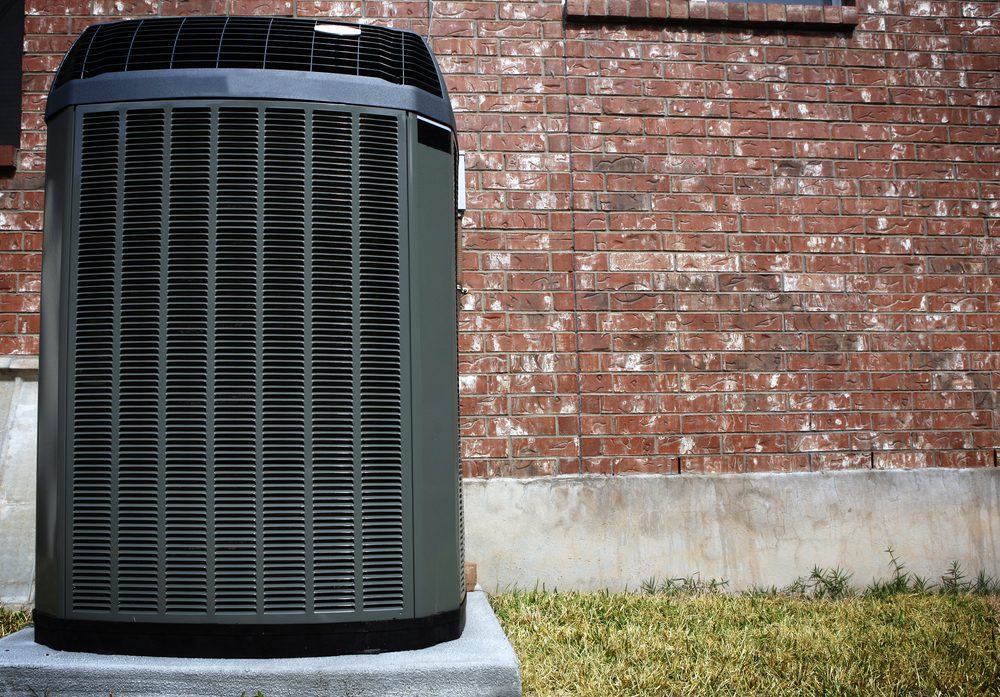Hot Water Heater in Kansas City

Hot Water Heaters
Hot water heater not working? If you have hot water heater problems, this guide will provide a breakdown of the types of hot water heaters, the different features of a hot water heater, and some troubleshooting tips that you can do on your own! Whether your hot water heater is leaking, making some strange noises, or releasing an unpleasant odor, we’ve got the solution for all issues related to a hot water heater in Kansas City.
Life Expectancy
Most water heaters have an 8-12 year warranty, so expect plenty of repair needs after you hit that mark. This time frame can be made even shorter in homes that don’t have water softeners. Since water heating makes up about 20% of your energy bill, it’s well worth it to invest in a new water heater that will boost efficiency by 4% (in water heaters under 55 gallons). Water heaters over 55 gallons can cut utility bills by 25-50% when replaced. The price of a water heater depends on the number of gallons they hold.
Size
When considering size, keep in mind that it’s only the first-hour rating (FHR) for storage-tank water heaters that matters. This tells you how much hot water the heater can deliver over a set period of time (the first hour). If you keep trying to use hot water after you’ve used up your allotted time, the water will turn tepid or cold.
An on-demand water heater doesn’t hold any water unless it has an auxiliary tank, but there is a limit on how much hot water it can produce in each time period (GPM: gallons per minute). You’ll receive a steady output of hot water as long as you don’t run multiple sources at once, like the shower and dishwasher. Several newer models of hot water heaters er are wider and taller than previous models due to increased insulation, so make sure you have room before you bring a new one in.
Storage Tank Water Heaters
Storage Tank Water Heaters are the most common types, and are made up of insulated tanks in which water is heated and kept until required. Then, the water emerges from a pipe on top of the water heater. If you go with a natural gas water heater, you’ll be using less energy at a lower cost than electric water heaters. However, these models also cost more at the time of the purchase.
Tankless Water Heater
For a tankless, on-demand water heater, water is heated through coils when you need the hot water. This is an energy-efficient method, but provides only a limited flow of hot water per each minute (3.5 gallons). This means that it’s an ideal option for those who don’t normally draw water for more than one use at a time, like running the dishwasher and shower both at once. This is the best option for homes that utilize natural gas to heat the water. The electric models sometimes need a costly upgrade for the home’s electricity capacity though.
Heat Pump Water Heater
If you choose to go with a heat pump (hybrid) water heater, expect some energy conservation. They capture heat from the air and transfer it to the water, using up to 60 percent less energy than standard electric water heaters. They come at a higher price, the installation process is similar, and the payback time is quick. They aren’t a great option for cold spaces, and should be placed somewhere that has a temperature between 40 and 90 degrees. With the heat pump on top, the hybrid water heater may need 7 feet of clearance from floor to ceiling. In addition, you’re going to need 1,000 cubic feet of uncooled space to capture enough heat from the air. Plus, you’ll need a drain nearby to discharge the condensate.
Solar Water Heater
Solar water heaters work by absorbing the sun’s heat via a roof-mounted cell and transferring it to an antifreeze-like fluid in a closed-loop system that funnels into the water tank. They save the most money in the summertime, and most employ a backup system that kicks in whenever necessary. You may be waiting 10 to 30 years to recuperate your costs though, so invest wisely.
Condensing Water Heater
The final option is a condensing water heater, which heats with gas and has a unit capacity of over 55 gallons. The tanks are similar to a conventional water heater except they absorb exhaust gases that would typically go out the flue (wasting energy). The gases are then blown through a coil that’s located in the base of the unit. From here, incoming cold water can absorb a large portion of the heat.
Hot Water Heater Features
Besides being knowledgeable about the different types of hot water heaters in Kansas City, you should also be versed on the different features of a hot water heater. For one, your warranty will determine how confident you can be with your purchase. Some warranties run as low as 3 years, so keep in mind that these heaters may not be the best quality. Heaters with longer warranties also tend to have larger elements or burners that make the water heating process faster and thicker insulation to reduce heat loss. Don’t be cheap with your water heater or you’ll be replacing it all the time.
Anti-scale devices (pictured below) reduce the buildup of mineral scale at the bottom of the tank by swirling the water. Even though scale can shorten the life of your heater, this may be a pricey investment. In addition, you can choose between brass and plastic drain valves, which are situated near the base of the water heater. They drain the water heater essentially. The brass valves will last longer! The glass-linked tanks are designed to slow down corrosion, and digital displays make it easy for you to monitor levels and adjust settings. The ability to adjust electric/heat-pump hybrid water heaters means you can set a vacation mode. In this mode, your heater will use just the heat pump for added efficiency while you’re gone.
Water Temperature
If you’re concerned that the hot water you’re receiving is either too hot or not hot enough, adjust the temperature dial on the front of the water heater. After waiting for a bit, check the water temperature at your faucet. If this tactic doesn’t work, it may be that your undersize water heater isn’t able to accommodate new fixtures that are draining on your water source (ie: high flow shower head). If this is the issue, you may need to purchase a larger water heater or get a tankless water heater. Keep in mind that drops in outdoor temperature will affect how hard your water heater has to work. Not only does your heater have to maintain the cold inbound water, but there’s also water cooling as it travels through the pipes.
Hot Water Heater Leaking
Another thing you can check for while troubleshooting is whether your hot water heater in Kansas City is leaking—look for signs of water near the base. If neither of these factors seems to be the problem, try flushing the water heater tank to clear out the mineral deposits. You might also check that the temperature-pressure relief valve is working correctly, since a faulty one will cause pressure to build up in the boiler. If your water is too hot, there’s too much steam, or you hear boiling sounds within the water heater, it may be that your appliance isn’t shutting off at its set temperature. If the temperature-pressure relief valve doesn’t release the excessive pressure from steam buildup, your water heater may have been improperly installed or the valve is faulty. You’ll need to replace it or get it fixed.
Odd Smells
If you experience a strange odor coming from your hot water heater in Kansas City, this may “be caused by a reaction between the hot water heater’s anode rod and water that has a high concentration of sulfates” according to hometips.com. Let the hot water run for two or three minutes. If you get a rotten egg smell, try flushing the hot water heater tank. If this doesn’t work, replace the anode rod (with one that’s flexible if you have limited space above your tank). With a garlic-like scent, it’s likely that your pilot light went out. To fix this, you should turn the gas valve control off and wait until the smell has dissipated before you relight the pilot light. If the smell still doesn’t disappear, call a professional and leave the location.
Noises
Noises are another issue you may come across with your hot water heater in Kansas City. These can be caused by the metal parts expanding and contracting, drips, or minerals/hard water scale accumulations within the tank. In order to prevent water heater corrosion through ionization, water heaters include a magnesium or aluminum anode rod (pictured below) which is inserted through the top of the tank. The buildup of hard water sediment which heats up and explodes in the tank can also be the culprit behind your noisy hot water heater in Kansas City. To remedy this, you can flush out the tank or contact a professional to get it taken care of.
Contact Us
If you experience any issues with your hot water heater or need a new system installed, contact us! We specialize in hot water heaters in Kansas City.



